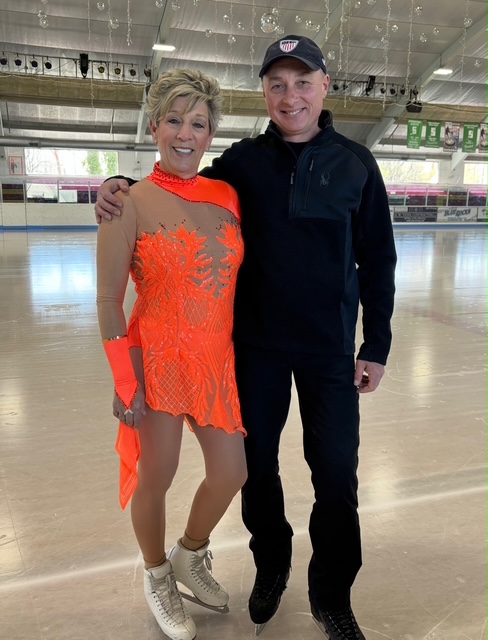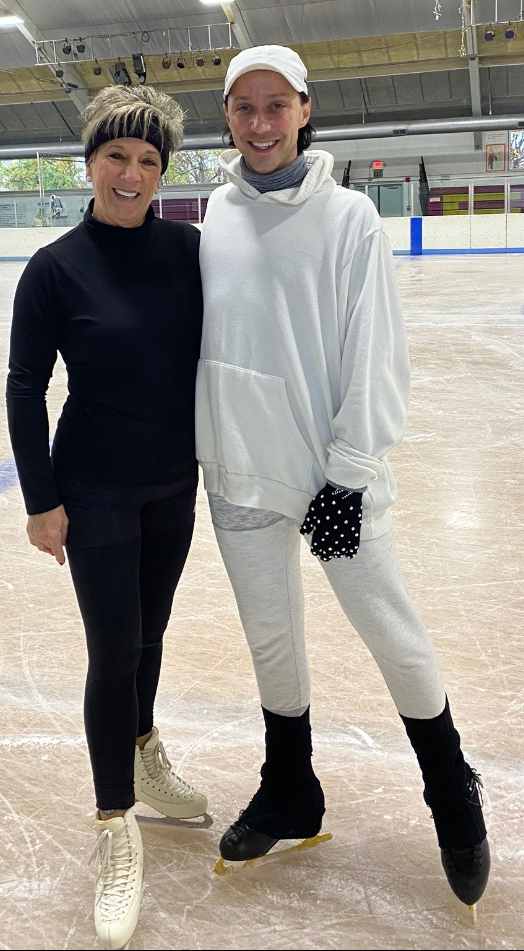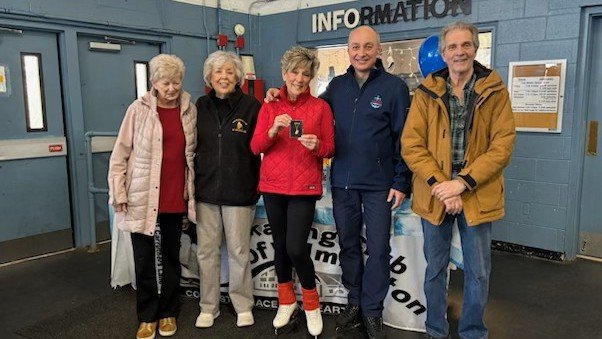Above: Sharon Rzasa, in red coat, is surrounded by club leaders and her coach (l-r) Dot Gualtieri, Carol Smith, Rzasa, Igor Yaroshenko and Peter Bilous during her most recent ice dance gold medal presentation.
By Michele Cooper
As a young girl, Sharon Rzasa skated on ponds and dreamed of becoming a figure skater. In her 30s she began skating on public sessions in rental skates and eventually started taking lessons. In April 2024, at age 64, she passed her final gold dance test.
“It took 30 years, but I did it,” Rzasa said. “When I first joined the Skating Club of Wilmington, I was beyond a newcomer in ice dance. I was in ‘duck walk’ stage. All the ice dancers were at exceedingly high levels. But I watched the other ladies and said to myself, ‘I will get there.’ I was flying high at the gold medal ceremony. It was surreal that I was actually there.”

Rzasa credits her coaches for her success. She passed the Westminster Waltz with five-time Ukrainian ice dance champion and two-time Olympian, Igor Yaroshenko. She also works on artistic expression with three-time U.S. champion and World and Olympic competitor Johnny Weir.
“I couldn’t ask for anybody better than my coaches,” Rzasa said. “I am fortunate that they want to work with me. They’re busy guys.”
Her coach points to Rzasa’s strengths as keys to her success.
“She is bubbly and creative,” Yaroshenko said. “She does feel the music [and is] full of expression. She is strong physically. She is also mentally strong and committed. She stopped skating for a while but came back to it and got the gold medal — a milestone that not many people achieve at that age.”
“We were a good fit from day one,” Rzasa, who took a break from training to care for her family and go back to college to earn a degree in liberal arts, said. “Plus, he is patient with me and can put up with my strong personally. When I skate with him, I want to make him proud.”
Rzasa also credits the judges and views failure as a learning tool.
“It took three tries to pass the Westminster because of that rocker turn,” she said. “When you get your results, your first thought is ‘oh no, I failed.’ But then you read the comments, and the judges’ notes make you a better skater.”
The Skating Club of Wilmington, which hosted the first U.S. Adult Championships in 1995, has always been supportive of adult skaters, Carol Smith, a former skater and previous club president, said.
“We have a lot of fun,” Smith, who watched Rzasa test the Westminster and presented the gold medal to her during a ceremony at the rink, said. “It’s impressive that she got her gold medal at her age.”

Younger skaters also admire Rzasa.
“[She] is nice and funny and I love her personality,” juvenile-level skater Carolyn Hoang said. “She’s energetic and happy in her dances . . . supportive and an inspiration.”
Carolyn’s mom, Nikki Do, agreed. “She is such a wonderful individual. She has passion and she brightens the whole room. All the young skaters call her grandma.”
Intent on moving forward, Rzasa has been working on her first international dance, the Silver Samba, which she will test in June and is starting work on the Rhumba. Yaroshenko has complete confidence in her.
“She has a lot of energy left for the internationals and free dances,” he said.
“I can’t wait to put the Silver Samba out there. It’s super fun with deep edges and expression,” said Rzasa, who plans to plans to partner the Midnight Blues and a free dance test with James Hernandez, a World bronze medalist who will represent Great Britain at the Olympics with partner, Phebe Bekker.
Alongside success and joy, there has been grief and sadness for Rzasa, who lost her parents in 2002 and her brother in 2025.
“When I first learned I passed my final gold dance part of me felt wow, what an accomplishment,” Rzasa said. “But with my whole family gone, I had no one to share it with, no one to call and scream to celebrate. But I’m sure they’re watching. They were supportive and excited about everything I did. They would have been proud that I achieved my goal.”
To honor her family, she is working with Weir to choreograph an artistic tribute program to “The Prayer,” sung by Cèline Dion and Andrea Bocelli.
Rzasa has come a long way from pond skating, rental skates and public sessions, yet still remembers passing the first pattern dance, the Dutch Waltz, with coach David Barker.
“It was scary but fun, and I knew I was hooked. That is why passing my gold dances is so surreal,” she said. “After all these years, I’m here, fulfilling my childhood dream.”


